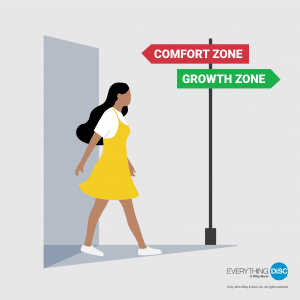Knowing one’s own DiSC® style, or that of another, can help you be aware of what situations might cause you stress and how you might respond. While this article was originally written in response to the COVID-19 restrictions, it has been updated and can apply to various stressors caused by major changes.
You might notice your D-style colleague trying to work harder or put in more hours to try to prove themselves. Or they might be focusing on all those areas where they don’t have control and freaking out a bit. Their mental strain might be showing itself through impatience and insensitivity.
What might be stressing the D style?
- lack of control over a situation
- appearance of being unprofessional or weak
- the possibility of being taken advantage of
- not getting definitive answers
- revisiting topics like schedules, COVID-19 responses, weather changes, politics
- interruptions
- lack of independence or being able to take action
- falling into a boring, unchallenging routine
- dealing with the emotions of others
- anything that challenges their core belief of “I’m valuable if I’m producing or on top”

What does the D style need during times of stress?
Progress: being able to get results quickly and efficiently
Control: having influence over decisions that affect them and their success
Justification: knowing how and why changes were made
Tips for the D style
- Remember that no one has the control they once did. The pandemic, return to workplaces, and even vaccination protocols are disruptive. So take a deep breath and let go of self-judgment. Practice self-acceptance.
- Identify what you need to and ultimately can control, then let go of what you can’t. Focus your energies where you can have the most positive impact today or this week.
- Allow for more time. You love seeing progress. But right now your colleagues and loved ones might need more time to get things done. You might need more time. This doesn’t mean you don’t hold yourself and others accountable, you just alter the timeline and necessary supports needed.
- Don’t do it all yourself. Collaboration matters. While you might want to see things getting checked off a to-do list, your influence and long-term goals might be better served by finding ways to collaborate, delegate, and support.
- Ask for feedback. No one has been prepared for all the stress we’re now experiencing, so we all need some perspective. Ask how others are perceiving you today. Listen and thank your respondent(s). Consider their words.
- Look for what you can learn from the S style. Consider establishing routines based on what you value. For example, if you value learning, take a regularly scheduled online course. If you value a relationship, schedule regular calls with that person.
- Start a new project. Find one that’s challenging or one that can be finished fairly quickly. Give yourself a sense of accomplishment and progress.
- Try on the receptive mindset typical of the S style. Stay open to others’ ideas and be willing to compromise.
Tips for every style
- Get enough sleep.
- Exercise as appropriate.
- Get outside. If you can’t get outside, look at images of outdoor beauty.
- Stay connected and social in safe ways.
- Practice self-compassion.
- Stay (or become) grateful. Studies have shown that those who practice gratitude are more optimistic and have better relationships.
- Look for opportunities to laugh. Watching Olly the Jack Russel Terrier might do the trick.
- Recognize that anxious thoughts, sadness, and all sorts of emotions will come up every day and they are normal. Acknowledge them, look at them with curiosity, and practice letting them go. Avoiding them will make them stronger.
- Take action by performing random acts of kindness for others.
- Ask for help if you need it. Now might be the time to reach out to a friend, a life coach, a therapist, or a help line. When we don’t ask for help or speak up about a problem, we’re likely to make poor decisions our organization’s bottom line can take a hit.
- Learn more about yourself with Everything DiSC Workplace or build your emotional intelligence with Everything DiSC Agile EQ.
We’d like to end this with these words from Jelena Kecmanovic, a founding director of the Arlington/DC Behavior Therapy Institute:
“Studies show that people who go through very difficult life experiences can emerge from them with a stronger sense of psychological resilience, rekindled relationships and a renewed appreciation of life. Some describe starting to live more fully and purposefully. With care and planning, we, too, can stay psychologically strong during the pandemic and perhaps even grow from this transformative experience.”

